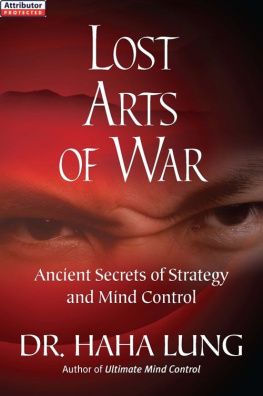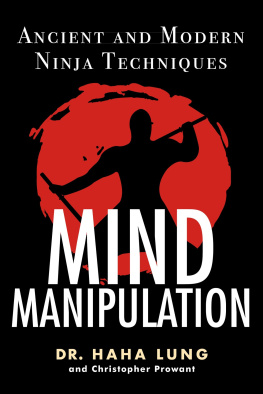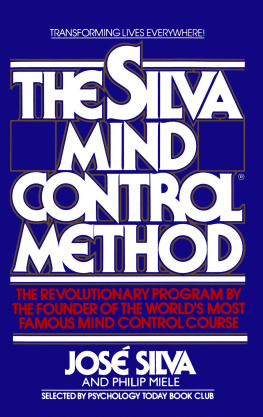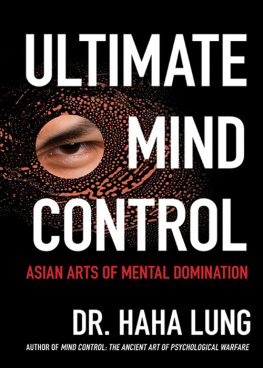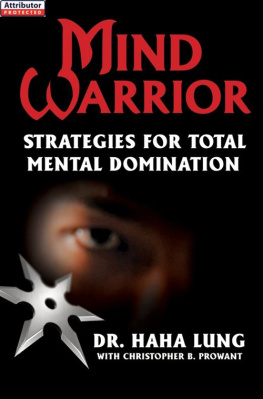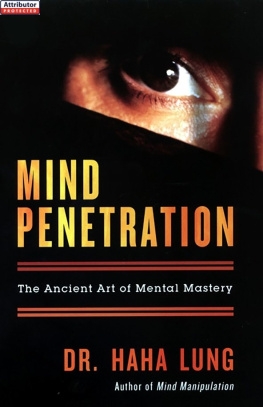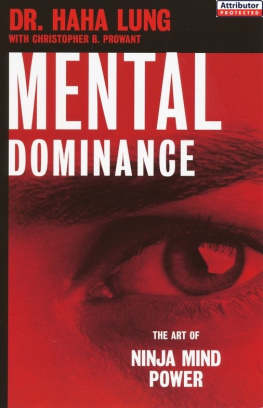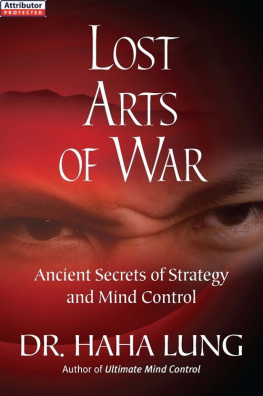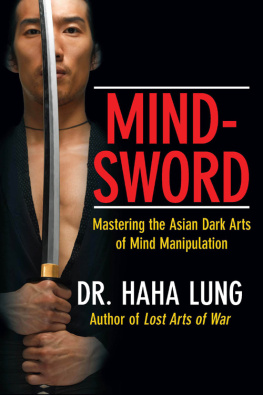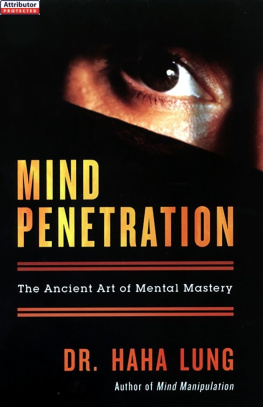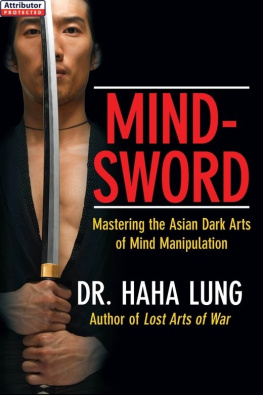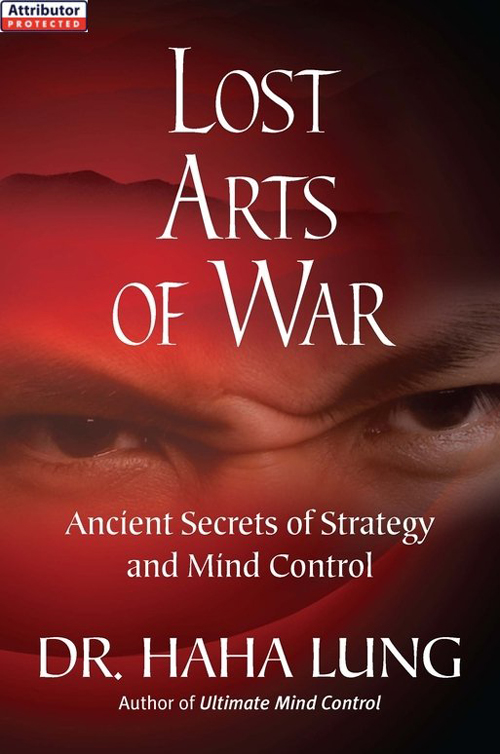To Red John F. Johnson
artist, friend.
Black science: Generic: Any strategy, tactic, or technique used to undermine a persons ability to reason and respond for themselves. Synonyms: Manipulation and mind control. Term originally coined by C. B. Black.
INTRODUCTION:
Beasts? Badmen? or Buddhas of Battle?
The end and perfection of our victories is to avoid the vices and infirmities of those whom we subdue.
Alexander the Great
W E STUDY HISTORY in order to make history. And by making history, we remake history in our own image. Ah, memory , that greatest of trickstersLoki laughing with the long-nose.
And so we study the historiesthe actions and thoughts of those who have gone before, those singular, often solitary, all too often sinister souls who long ago forded forbidding rivers of personal doubt, who climbed over or squeezed around or else broke and blasted (and bribed?) their way past any boulder or bonehead blocking their way, dauntlesslyand ruthlessly ?carving paths through the dark wilderness of ignorance to the wisdom waiting in the clearing just beyond.
True, all too often these peerless and fearless pioneers of personal empowerment were destined to decisively ruthlessly !hack a clear swathe through acres of the worry-weeds and clinging vines deliberately planted in their path by fellow men both indolent and insolent.
But carve those paths they did. And now, whether we choose to follow in their footstepsintrepid, insightful ... insidious ?or, just as determined as they, inspired by their examples and anecdotes, we instead choose to map out our own unique path, we can take comfort and further inspiration from the fact we have both their thoughts and our own thoughts to guide usa two-edged sword if ever there was one.
Yet can our thoughtsof adventure, of glory, perhaps revengebe enough to augment these elder teachings, and together vouchsafe us for the coming struggle?
The thoughts that tempt and test the mind of youth are not necessarily the same thoughts that trouble the sleep and waking moments of the olderhopefully wiser?man.
Solomon, dubbed the wisest man who ever lived, powerful king, with a harem of over 4,000 wives and concubines, authored The Wisdom of Solomon believed written when he was at the height of his youth and power and vigor.
Later he would also write Ecclesiastes , whose resigned almost fatalistic tone leads experts to conclude it was written nearer the end of Solomons life, in his days of waning health, after hed been there, done that, and had grownunderstandably?more cynical: Vanity of vanities, all is vanity! What does a man gain by all his toil ...
In other words, its not unheard of for the wide-eyed optimism and ambitions of youth to become succumb to the raised-eyebrow ambiguity and compromise of middle age to, ultimately, the cynical, narrow-eyed abandonment of dreams, pride, and principle in waning years.
All too often, for all too many, age becomes synonymous with settling for less.
But not for all men, e.g., Hannibal, Spartacus, Yoritomo, and Vlad Tepes.
Cynical? Perhaps because three out of those four never lived to see a ripe old age.
A little more optimistic? Perhaps because these were men made of sterner stuff.
But, for so many, Spring gives way to Summer, futilely trying to fend off that inevitable Fall toward the finality of Winter.
Thus, in the course of any mans life, we find enthusiastic Spring truths, still-optimistic Summer truths, more pragmatic Fall truths, and the inevitable harsh, cold reality of Winter truths.
Thus, when studying the words of great and powerful mendare we say, men for all seasons?we must not look at merely who penned this wisdom and wile before us, but when the tempo and temper of the timesas well as where whether written while wallowing leisurely in the lap of luxury, or hurriedly scribbled down in the heat of battle, its eve, or its aftermath.
Different times try men (and their souls?) differently. Events a man in one era decries as crisis another man in another time smilingly spies and sighs opportunity.
Indeed, would even the same man pen the same words in the eternally hopeful Spring of life as he would in the Winter of his discontent? Didnt the example of Solomon lay that quandary to rest?
Might not even the same man viewed from various vantages in his own time be seenand be recordeddifferently by friend and foe?
Perception creates reality. Thus to some we are beast. To others merely badmen. To still others, those viewing us from a clearer, perhaps kinder perspective, we are Buddhas, beings who relentlessly pursue wisdom, apprehend it, and then freely share that bounty with our fellows.
So what of these men before us today: Hannibal the Conqueror; Spartacus the Gladiator-turned rebel; Yoritomo, Japans first Shogun ; and Vlad Tepes, the fearless Prince who succeeded in saving medieval Europe at the cost of his own kingdom?
To some they are beasts. To others, badmen. But to some, they are truly deserving of the Eastern accolade Buddhaan Enlightened One, often translated one who is awake.
When we examine what deviant, devilish, or simply determined DNA such men share, we must look beyond superficial influences: That Spartacus, so obviously inspired by Hannibal, that the gladiator-turned-slave Messiah walked the same Roman roads as the Carthaginian conqueror a hundred years before; that some 1,800 years after Spartacus was himself taken in chains from the hills of his native Thrace, another rebel and guerilla fighter, Vlad Tepes, fought in some of those same hills, perhaps using the same hidden ways and warrens of Spartacus to escape his enemies.
And what of Yoritomo? If not sharing the same Mediterranean bloodline as Hannibal, Spartacus, and Vlad Tepes, if not spilling the same enemies blood, still the Japanese commander surely shared the DNA of determination with his Carthaginian, Thracian, and Rumanian counterparts.
Yoritomo knew, as did Hannibal, Spartacus, and Vlad Tepes, what it was like to have to hunker down in the hills with a price on your head while the greedy blades of a victorious enemy beat the bush.
Yoritomo knew, as did Hannibal, Spartacus, and Vlad Tepes, the pain of patience , of having to bite your lips and bide your time, until frustration could finally be melted down and recast as razor-sharp revenge!
Yoritomo knew too, as did Hannibal, Spartacus, and Vlad Tepeshowever brieflythe pleasure of seeing your patience and planning and persistence finally pay off as your humbled enemy is brought before youeither on his knees, or else his head on a pole!

